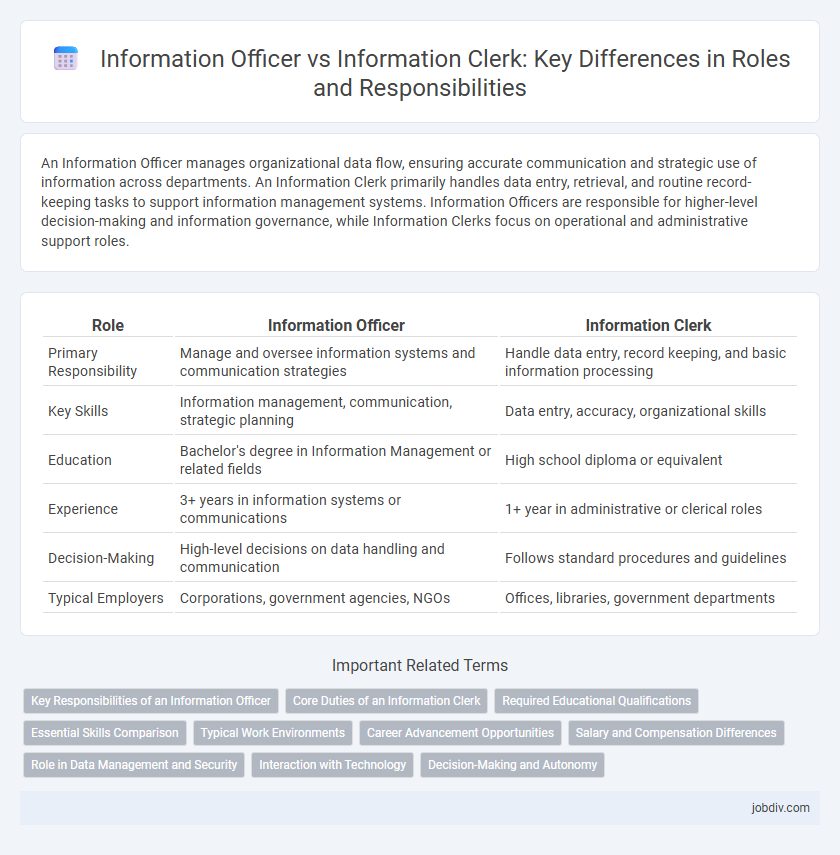An Information Officer manages organizational data flow, ensuring accurate communication and strategic use of information across departments. An Information Clerk primarily handles data entry, retrieval, and routine record-keeping tasks to support information management systems. Information Officers are responsible for higher-level decision-making and information governance, while Information Clerks focus on operational and administrative support roles.
Table of Comparison
| Role | Information Officer | Information Clerk |
|---|---|---|
| Primary Responsibility | Manage and oversee information systems and communication strategies | Handle data entry, record keeping, and basic information processing |
| Key Skills | Information management, communication, strategic planning | Data entry, accuracy, organizational skills |
| Education | Bachelor's degree in Information Management or related fields | High school diploma or equivalent |
| Experience | 3+ years in information systems or communications | 1+ year in administrative or clerical roles |
| Decision-Making | High-level decisions on data handling and communication | Follows standard procedures and guidelines |
| Typical Employers | Corporations, government agencies, NGOs | Offices, libraries, government departments |
Key Responsibilities of an Information Officer
Information Officers oversee the collection, management, and dissemination of organizational data, ensuring accuracy and security in information handling. They develop and implement information policies, coordinate communication between departments, and maintain compliance with data protection regulations. Unlike Information Clerks who focus on routine data entry and record keeping, Information Officers are responsible for strategic information management and decision support.
Core Duties of an Information Clerk
An Information Clerk primarily manages data entry, organizes files, and assists with basic information retrieval to support smooth office operations. They handle requests for information, maintain records, and ensure accuracy in documentation. Their core duties emphasize administrative support and client interaction rather than strategic information management.
Required Educational Qualifications
An Information Officer typically requires a bachelor's degree in information management, library science, or a related field to handle data analysis, communication strategies, and information systems. An Information Clerk generally needs a high school diploma or equivalent, with on-the-job training sufficient for managing data entry, record keeping, and basic information retrieval tasks. Advanced certifications in information technology or data management can enhance qualifications for both roles, but the complexity and responsibility levels distinguish their educational requirements.
Essential Skills Comparison
An Information Officer requires advanced skills in data analysis, strategic communication, and information management systems, enabling effective decision-making and policy implementation. In contrast, an Information Clerk focuses on clerical abilities such as data entry, record keeping, and basic information retrieval, ensuring accurate documentation and administrative support. Both roles demand attention to detail and proficient use of information technology, but the Officer's role emphasizes higher-level analytical and organizational competencies.
Typical Work Environments
Information Officers typically work in corporate offices, government agencies, and large organizations where strategic communication and data management are critical, handling complex information systems and policy compliance. Information Clerks are commonly found in administrative settings such as libraries, hospitals, and customer service centers, focusing on data entry, record keeping, and routine information dissemination. Both roles require strong organizational skills, but Information Officers operate in environments demanding higher-level decision-making and confidentiality.
Career Advancement Opportunities
Information Officers typically have greater career advancement opportunities due to their strategic role in managing communication and data dissemination within organizations, often progressing to senior management or specialized positions. Information Clerks generally hold entry-level roles focused on data entry, record keeping, and administrative support, with limited upward mobility unless supplemented by further education or training. Advanced skills in data analysis, cybersecurity, and information systems significantly enhance promotion prospects for Information Officers compared to clerical roles.
Salary and Compensation Differences
Information Officers typically earn higher salaries than Information Clerks, reflecting their advanced responsibilities in data management and strategic communication. According to industry reports, the median annual salary for an Information Officer ranges from $55,000 to $80,000, while Information Clerks average between $30,000 and $45,000. Compensation packages for Information Officers may include bonuses and performance incentives, which are less common in the clerical role.
Role in Data Management and Security
Information Officers oversee data governance frameworks, ensuring compliance with privacy laws and implementing robust security protocols to protect sensitive information. Information Clerks handle data entry, maintenance, and routine monitoring of databases, supporting data accuracy and accessibility under established security guidelines. The Officer's role emphasizes strategic data protection and policy enforcement, while the Clerk focuses on operational data management tasks.
Interaction with Technology
Information Officers utilize advanced software systems and data management tools to analyze and disseminate information efficiently, ensuring accurate communication across platforms. Information Clerks primarily handle data entry and basic information retrieval using standard office software, supporting administrative tasks with routine technological interaction. The complexity and strategic use of technology distinguish the Information Officer's role from the more operational technology use by Information Clerks.
Decision-Making and Autonomy
Information Officers typically possess greater decision-making authority and autonomy, overseeing data management strategies and ensuring compliance with organizational policies. In contrast, Information Clerks operate under closer supervision, performing routine data entry and record-keeping tasks with limited decision-making power. The distinction lies in the level of responsibility, with Officers influencing information flow and Clerks supporting operational execution.
Information Officer vs Information Clerk Infographic

 jobdiv.com
jobdiv.com